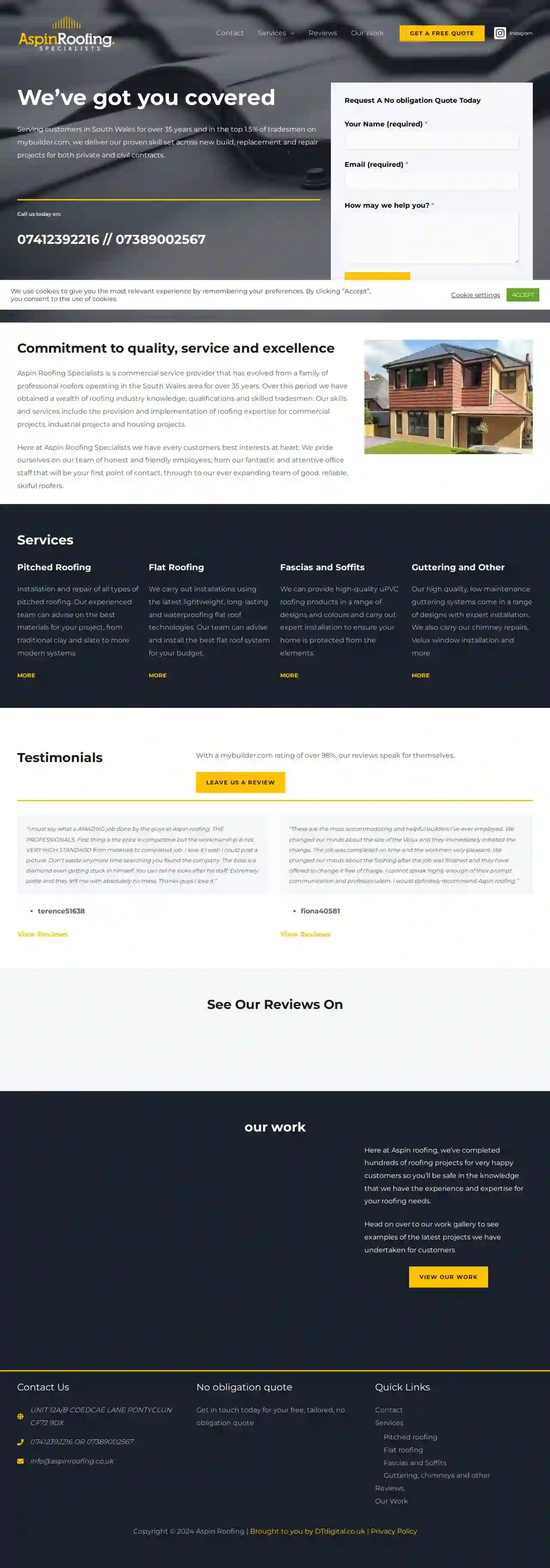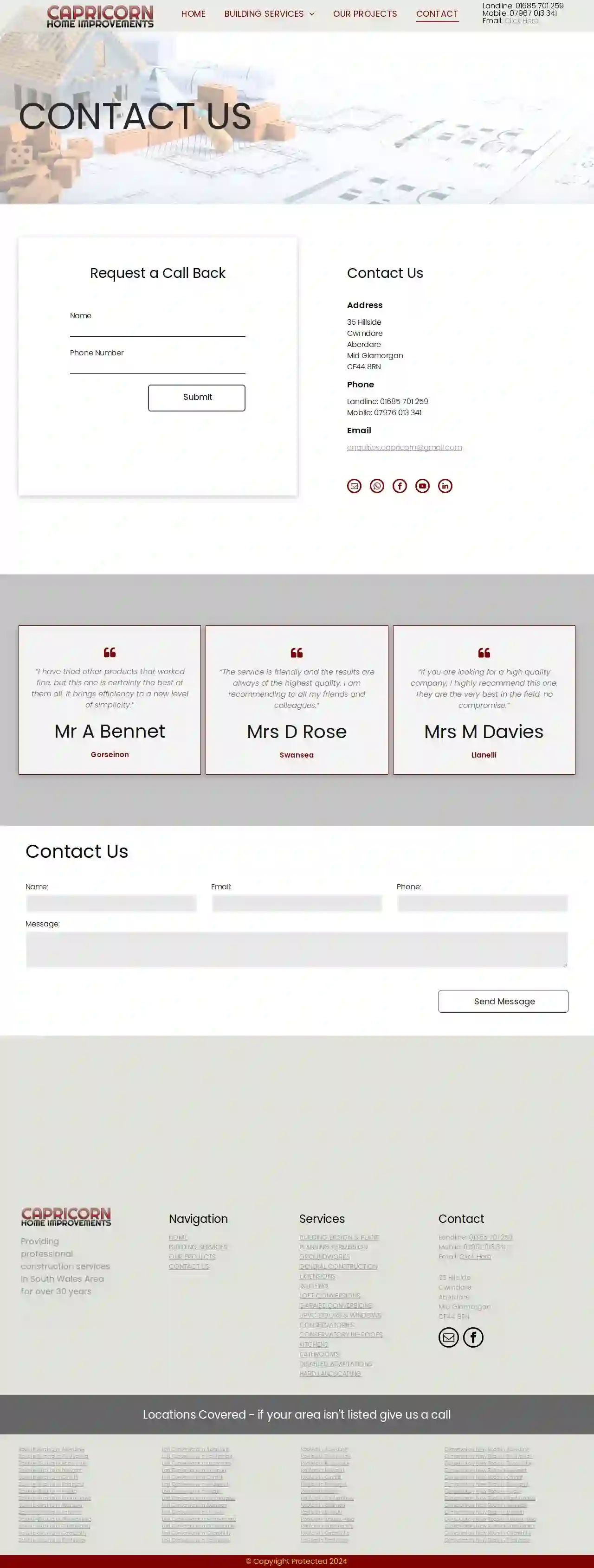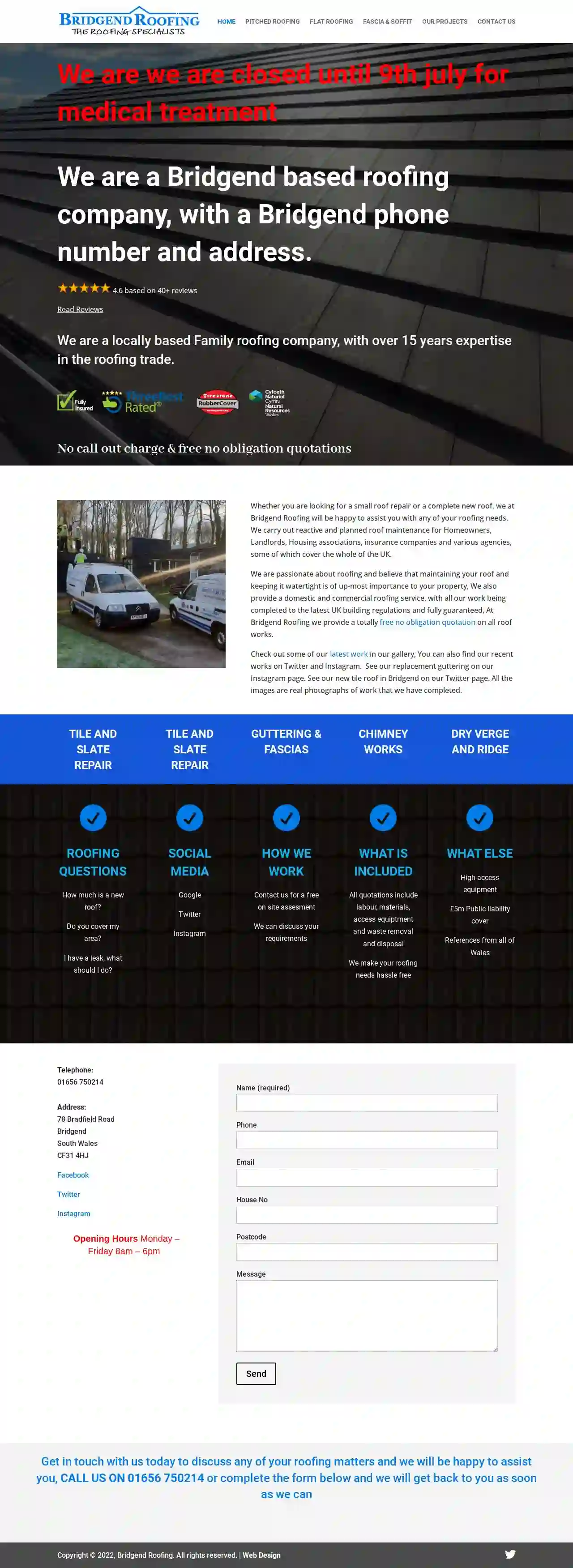Roofing Companies Pontardulais
Find top Roofing Service in Pontardulais
Get 3 FREE Roofing Service quotes for your project today! Compare profiles, reviews, accreditations, portfolio, etc... and choose the best offer.

Jones K Roofing
51 reviewsGBAt South Wales Roofing Network, our members are dedicated to providing a comprehensive range of roofing services across South Wales. Whether you need roof repairs, flat roofing, pitched roofing, fascias and soffits, or any other roofing-related service, our experienced and qualified team can handle it all. We understand the importance of a well-built roof for your home or business, and we strive to deliver exceptional workmanship and customer satisfaction. Our members are committed to using high-quality materials and the latest roofing techniques to ensure long-lasting and reliable results. We cover a wide range of areas throughout South Wales, so no matter where you are located, we can provide you with the roofing solutions you need. Contact us today to receive a free quotation and let us take care of your roofing needs.
- Services
- Why Us?
- Accreditations
- Gallery
Get Quote
Aspin Roofing Specialists
4.414 reviewsUNIT 12A/B COEDCAE LANE, PONTYCLUN, CF72 9DX, GBAspin Roofing Specialists is a family-run business with over 35 years of experience serving customers in South Wales. We are proud to be in the top 1.5% of tradesmen on mybuilder.com, a testament to our commitment to quality, service, and excellence. Our team of skilled roofers and friendly office staff are dedicated to providing our customers with the best possible experience. We offer a wide range of roofing services, including pitched roofing, flat roofing, fascias and soffits, guttering, chimney repairs, and Velux window installation. We use only the highest quality materials and our work is fully guaranteed. Whether you need a new roof, a repair, or simply some advice, Aspin Roofing Specialists is here to help.
- Services
- Why Us?
- Our Team
- Testimonials
- Gallery
Get Quote
Glamorgan Flat Roofing Co
53 reviewsGBAt South Wales Roofing Network, our members are dedicated to providing a comprehensive range of roofing services across South Wales. Whether you need roof repairs, flat roofing, pitched roofing, fascias and soffits, or any other roofing-related service, our experienced and qualified team can handle it all. We understand the importance of a well-built roof for your home or business, and we strive to deliver exceptional workmanship and customer satisfaction. Our members are committed to using high-quality materials and the latest roofing techniques to ensure long-lasting and reliable results. From small repairs to large-scale projects, we have the expertise and resources to meet your specific needs. Contact us today to receive a free quotation and let us help you protect your property with a durable and weatherproof roof.
- Services
- Why Us?
- Gallery
Get Quote
Silvey Roofing Ltd
4.823 reviews52 Castle Avenue, Penarth, CF64 1AA, GBOur family run business was founded by Keith Silvey who is a qualified NVQ slate and tile roofer. Committed to quality, Keith Silvey started out in the building industry at the age of 16, and that’s where he discovered a passion for roofing. After 20 years of being in the industry, Keith and his wife Helen set up Silvey Roofing Ltd in order to provide a high quality service in this field. Since then Helen and Keith's son (Ethan) has joined the team who has recently completed his University degree and also is in the process of completing his NVQ in slate and tiling.
- Services
- Why Us?
- Our Team
- Gallery
Get Quote
Redhill Roofing
56 reviews36 St Michaels road, Kingsteignton, TQ12 3AQ, GBRedhill Roofing is a family-run business with a rich history spanning 40 years. Established by Adam's father, the company has been a trusted name in the roofing industry for generations. Adam, who joined the business 26 years ago, carries on the family tradition, ensuring Redhill Roofing remains at the forefront of modern roofing practices. We specialize in all aspects of roofing services, from flat roofs and re-roofing to repairs, valley replacements, fascia and guttering, sun tunnels, skylight installations, and even moss removal and roof cleaning. At Redhill Roofing, we pride ourselves on providing a reliable, efficient, and friendly service. Customer satisfaction is our top priority, and we strive to exceed expectations with our high standards and comprehensive expertise. We use only the best quality materials to ensure long-lasting results. Whether you're in Newton Abbot, Teignmouth, or the surrounding areas, Redhill Roofing is your trusted partner for all your roofing needs. Don't hesitate to get in touch for a free quote and experience the Redhill Roofing difference!
- Services
- Why Us?
- Our Team
- Testimonials
- Gallery
Get Quote
M Green roofing
GBYour search for a reliable roofing company that offers cost-effective roofing services ends with M Green Roofing.Established since 2011, M Green Roofing has been providing a comprehensive range of roofing services to domestic and commercial customers. We cover all aspects of roofing and we can help you keep your roof in excellent condition. We have the skills and expertise to work on any type of roof.Some of the locations we serve include Rhondda Cynon Taff Cardiff Area Dinas Powys Vale of Glamorgan Llantwit Major Penarth Barry BridgendNo job is too big or too small Whether you need gutter cleaning services or a complete roof replacement, we can help.Whatever the size of the job, we can get it done for you.From flat roofs to slate roofs, when you choose us, you can rest assured that you are in safe hands. Take a look at our completed projects.
- Services
- Why Us?
- Gallery
Get Quote
Capricorn Home Improvements
Cwmdare, Aberdare, 35 Hillside, CF44 8RN, GBWelcome to Capricorn Windows Limited we are a family run business with over 30 years experience in property Maintenance and Construction company based in Mid Glamorgan and operating across the South West Wales area. We work for, and welcome enquiries from Domestic, Commercial and Local Authority clients and are pleased to be Local Authority Approved. One aspect of our business that we are very proud of and our clients have complimented us on is our ability to carry out all the stages of each and every job, from providing the drawings and designs, to obtaining planning permission to groundworks and to the construction and plumbing and electrical work to finishing off the job with painting and decorating. As a business we have found over the years that our work is our best advert and most of our enquiries come from personal recommendations from previous clients that are pleased with our work and happy to recommend us to future clients. We welcome enquiries from all clients and we are happy to provide free and friendly unbiased advice and free written quotations for all works. Whatever the size of your project we are here to help and welcome enquiries if you would like an informal chat with us please do not hesitate to contact us we never use hard sell tactics used by some other less scrupulous firms we just offer free, unbiased, professional and friendly advice.
- Services
- Why Us?
- Our Team
- Testimonials
- Gallery
Get Quote
Bridgend Roofing
4.449 reviews78 Bradfield Road, Bridgend, CF31 4HJ, GBWe are a Bridgend based roofing company, with a Bridgend phone number and address. We are a locally based Family roofing company, with over 15 years expertise in the roofing trade. No call out charge & free no obligation quotations. Whether you are looking for a small roof repair or a complete new roof, we at Bridgend Roofing will be happy to assist you with any of your roofing needs. We carry out reactive and planned roof maintenance for Homeowners, Landlords, Housing associations, insurance companies and various agencies, some of which cover the whole of the UK. We are passionate about roofing and believe that maintaining your roof and keeping it watertight is of up-most importance to your property. We also provide a domestic and commercial roofing service, with all our work being completed to the latest UK building regulations and fully guaranteed. At Bridgend Roofing we provide a totally free no obligation quotation on all roof works. Check out some of our latest work in our gallery, You can also find our recent works on Twitter and Instagram. See our replacement guttering on our Instagram page. See our new tile roof in Bridgend on our Twitter page. All the images are real photographs of work that we have completed. TILE AND SLATE REPAIR TILE AND SLATE REPAIR GUTTERING & FASCIAS CHIMNEY WORKS DRY VERGE AND RIDGE ROOFING QUESTIONS How much is a new roof? Do you cover my area? I have a leak, what should I do? SOCIAL MEDIA Google Twitter Instagram HOW WE WORK Contact us for a free on site assesment We can discuss your requirements WHAT IS INCLUDED All quotations include labour, materials, access equiptment and waste removal and disposal We make your roofing needs hassle free WHAT ELSE High access equipment £5m Public liability cover References from all of Wales Telephone: 01656 750214 Address: 78 Bradfield Road Bridgend South Wales CF31 4HJ Facebook Twitter Instagram Opening Hours Monday – Friday 8am – 6pm Get in touch with us today to discuss any of your roofing matters and we will be happy to assist you, CALL US ON 01656 750214 or complete the form below and we will get back to you as soon as we can Twitter Copyright © 2022, Bridgend Roofing. All rights reserved. | Web Design Call Now Button
- Services
- Why Us?
- Gallery
Get Quote
East Devon Roofing Ltd
4.218 reviewsExeter, GBEast Devon Roofing is a family-run business based in Exeter, serving our customers throughout the South West. With many years experience in all aspects of roofing, our team of fully qualified roofers will ensure your roof is in safe hands. From a simple repair to a complete roof installation, you can be assured of workmanship second to none.
- Services
- Why Us?
- Accreditations
- Our Team
- Testimonials
- Gallery
Get Quote
Rhondda Roofing Supplies Ltd
57 reviews4 Ffwrd Amos industrial Estate, Tonypandy, CF40 1HZ, GBRHONDDA ROOFING SUPPLIES FOR ALL YOUR ROOFING NEEDS Rhondda roofing supplies and Rhondda UPVC centre is an independent roofing merchant based in Tonypandy south Wales. Our aim is to provide customers with the highest quality materials sourced from our network of manufacturers to ensure our customers projects are completed to the highest possible standards. We provide an extensive range of goods to suit our customers’ needs. Contact us today we know we can help.
- Services
- Why Us?
- Gallery
Get Quote
Over 12,314+ Roofers in our network
Our roofing contractors operate in Pontardulais and surroundings!
Roofyng.co.uk has curated and vetted Top Roofers in and around Pontardulais. Find a top & trustworthy pro today.
Frequently Asked Questions About Roofing Companies
- Asphalt Shingles: 20-30 years
- Metal Roofing: 40-70 years
- Tile Roofing: 50-100 years or more (clay and slate)
- Flat Roofing: 15-30 years (depending on material)
- Slate: 100 years or more
- Wood Shakes or Shingles: 30-50 years (with proper maintenance)
- Clear the Area: Remove any vehicles, outdoor furniture, or other items from around your house to provide the roofing crew with easy access.
- Protect Landscaping: Cover plants, shrubs, and other landscaping elements near the house with tarps or plastic sheeting to protect them from falling debris.
- Clear the Attic: Remove or cover items stored in your attic, as dust and debris might fall through during the removal of the old roof.
- Notify Neighbors: It's courteous to inform your neighbors about the upcoming roof replacement project, especially if it's likely to be noisy or disruptive.
- Discuss Logistics with the Contractor: Coordinate with the roofing contractor regarding access to your property, parking arrangements, and any special instructions or concerns you have.
- Leaks or Water Stains: Water stains on ceilings or walls, dripping water, or dampness in the attic.
- Missing, Cracked, or Curled Shingles: Inspect for damaged or missing shingles, especially after a storm.
- Damaged Flashing: Look for rust, corrosion, or gaps in flashing around chimneys, vents, or skylights.
- Sagging or Uneven Rooflines: A sagging roof could indicate structural problems.
- Granule Loss: Excessive granules in gutters suggest aging asphalt shingles.
- Moss or Algae Growth: Can trap moisture and damage roofing materials.
- Age: If your roof is nearing or exceeding its expected lifespan, it's wise to consider replacement.
- Multiple Leaks: Several leaks or leaks that reappear after repairs suggest a widespread problem.
- Extensive Damage: Large areas of damaged, missing, or deteriorated roofing materials might be too costly or difficult to repair effectively.
- Sagging or Structural Issues: Sagging, deflection, or other structural issues indicate a compromised roof that needs replacement.
- Granule Loss (Asphalt Shingles): Significant granule loss indicates weathering and reduced protection.
- Curling or Buckling Shingles: Signifies age or improper ventilation.
- Increased Energy Bills: A poorly insulated roof can lead to higher heating and cooling costs.
How long does a roof typically last?
How do I prepare for a roof replacement?
What are some common signs of roof damage?
What are the signs that my roof needs to be replaced?
How long does a roof typically last?
- Asphalt Shingles: 20-30 years
- Metal Roofing: 40-70 years
- Tile Roofing: 50-100 years or more (clay and slate)
- Flat Roofing: 15-30 years (depending on material)
- Slate: 100 years or more
- Wood Shakes or Shingles: 30-50 years (with proper maintenance)
How do I prepare for a roof replacement?
- Clear the Area: Remove any vehicles, outdoor furniture, or other items from around your house to provide the roofing crew with easy access.
- Protect Landscaping: Cover plants, shrubs, and other landscaping elements near the house with tarps or plastic sheeting to protect them from falling debris.
- Clear the Attic: Remove or cover items stored in your attic, as dust and debris might fall through during the removal of the old roof.
- Notify Neighbors: It's courteous to inform your neighbors about the upcoming roof replacement project, especially if it's likely to be noisy or disruptive.
- Discuss Logistics with the Contractor: Coordinate with the roofing contractor regarding access to your property, parking arrangements, and any special instructions or concerns you have.
What are some common signs of roof damage?
- Leaks or Water Stains: Water stains on ceilings or walls, dripping water, or dampness in the attic.
- Missing, Cracked, or Curled Shingles: Inspect for damaged or missing shingles, especially after a storm.
- Damaged Flashing: Look for rust, corrosion, or gaps in flashing around chimneys, vents, or skylights.
- Sagging or Uneven Rooflines: A sagging roof could indicate structural problems.
- Granule Loss: Excessive granules in gutters suggest aging asphalt shingles.
- Moss or Algae Growth: Can trap moisture and damage roofing materials.
What are the signs that my roof needs to be replaced?
- Age: If your roof is nearing or exceeding its expected lifespan, it's wise to consider replacement.
- Multiple Leaks: Several leaks or leaks that reappear after repairs suggest a widespread problem.
- Extensive Damage: Large areas of damaged, missing, or deteriorated roofing materials might be too costly or difficult to repair effectively.
- Sagging or Structural Issues: Sagging, deflection, or other structural issues indicate a compromised roof that needs replacement.
- Granule Loss (Asphalt Shingles): Significant granule loss indicates weathering and reduced protection.
- Curling or Buckling Shingles: Signifies age or improper ventilation.
- Increased Energy Bills: A poorly insulated roof can lead to higher heating and cooling costs.